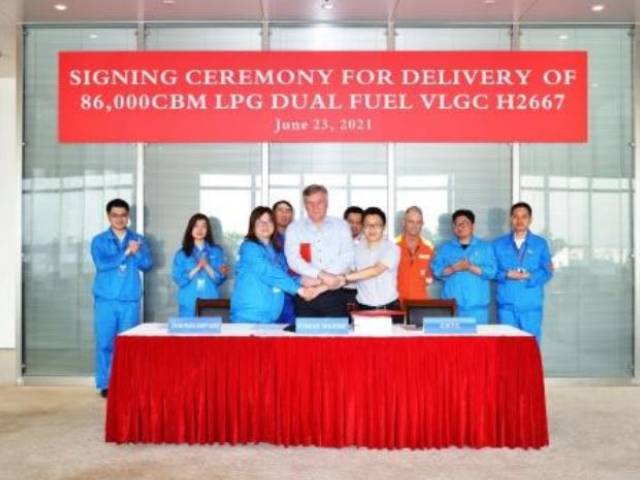EXMAR is proud to announce the delivery of the 88,000 m3 LPG/C FLANDERS INNOVATION from Jiangnan Shipyard, China. Being the first-ordered, most efficient and largest dual fuel LPG carrier in the world, her successful delivery again underlines EXMAR’s ability to innovate and improve industry standards.
Being a future-driven company, EXMAR took on a serious challenge with this innovative project completing a project of this size during a global pandemic. As the first of two new built Very Large Gas Carriers (VLGCs), the delivery of FLANDERS INNOVATION is revisiting market standards in terms of ship design, complying with and even surpassing stringent IMO rules and regulations.
Francis Mottrie, Chief Executive Officer at EXMAR, is happy that the vessel’s inaugural voyage is finally here: “We are proud to show the world where we stand as EXMAR when it comes to innovation, safety, sustainability and teamwork. Successfully completing a project of this size under current challenging circumstances is a testimony to our crew’s perseverance.”
Commitment to Sustainability
In addition to its remarkable size, the vessel’s unique dual-fuelled LPG engines will greatly reduce CO2 emissions by about 38% compared to the IMO reference lines for VLGCs. During the construction and the design of the vessel, special attention has been given to energy efficiency and minimising environmental impact, adding several ECO-friendly Class Notation features and selecting equipment with power saving in mind. This future-proof effort underlines EXMAR’s commitment to sustainability.
Fully Financed
The vessel will enter a 5-year charter to Equinor ASA (Norway) and is financed through a sale-lease-back scheme with the Japanese shipping group Doun Kisen as will be the case with her sister vessel, delivering later this summer.








































